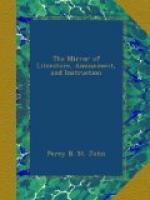New Bankrupt Court.—One of the inferior judges, whose salaries are, by the Act, to be paid out of the fees, seeing that the whole amount was absorbed by the chief, observed to an associate on the bench, “Upon my word, R——, I begin to think that our appointment is all a matter of moonshine.” “I hope it may be so,” replied R——, “for then we shall soon see the first quarter.”
The same humorous judge had listened to a very long argument on a particular case in which the counsel rested much upon a certain act of parliament. His opponent replied, “You need not rely on that act, for its teeth have been drawn by so many decisions against it, that it is worth nothing.” Still the counsel argued on, and insisted on its authority; after listening to which for a good hour, his lordship drily remarked, “I do believe all the teeth of this act have been drawn, for there is nothing left but the jaw.”—Literary Gazette.
Criticism.—A print of a wounded leopard is described by a contemporary as “a powerful exhibition of animal agony.” Did our critic ever hear of vegetable agony?
Humbug.—A correspondent of the Times says “Every body is not acquainted with the etymology of the word Humbug. It is a corruption of Hamburgh, and originated in the following manner: During a period when war prevailed on the Continent, so many false reports and lying bulletins were fabricated at Hamburgh, that, at length, when any one would signify his disbelief of a statement, he would say, ’You had that from Hamburgh;’ and thus, ‘That is Hamburgh,’ or ‘Humbug,’ became a common expression of incredulity.”
A Clincher.—An American paper says, this is the method of catching tigers in India:—“A man carries a board, on which a human figure is painted; as soon as he arrives at the den, he knocks behind the board with a hammer; the noise rouses the tiger, when he flies in a direct line at the board, and grasps it, and the man behind clinches his claws in the wood, and so secures him.”
Franking Letters.—The Princess Augusta asked Lord Walsingham for a frank; he wrote one for her in such detestable characters that, at the end of a week, after having wandered half over England, it was opened, and returned to her as illegible. The Princess complained to Lord Walsingham, and he then wrote the frank for her so legibly, that at the end of a couple of days, it was returned to her, marked “FORGERY.”—The Town.
Epigram from Scarron.
A Confessor was caugh t’other day
rather jolly,
Who observed, “When a man has committed
a folly,
If he has any sense left, hastens straightway
to me,
When, confessing his guilt, I can soon
set him free;
But how hard is my fate! for when wrong
I have done,
Absolution’s denied me by every
one;
In which case, that I may from conscience
escape,
Take refuge from thought in the juice
of the grape.”




